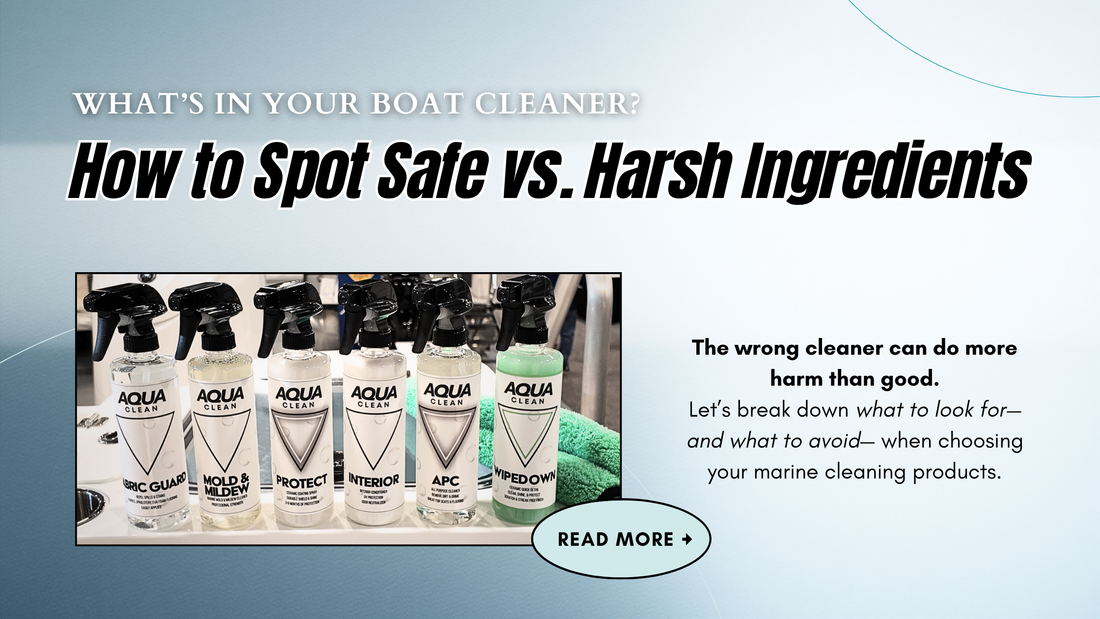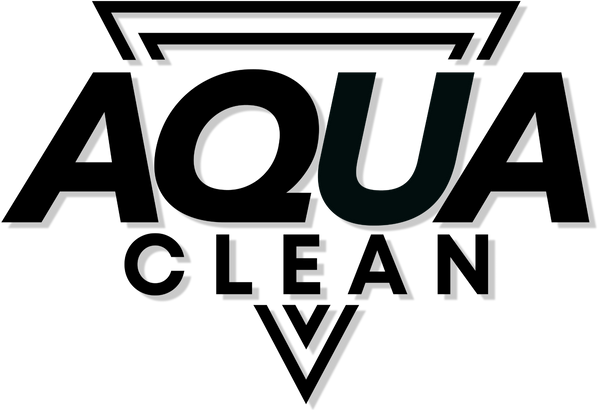
What’s in Your Boat Cleaner? How to Spot Safe vs. Harsh Ingredients
Share
Your boat faces some of the harshest environments on the planet—sun, salt, grime, and all kinds of unexpected messes. Keeping it clean isn’t just about looking good; it’s about protecting your investment. But here’s something most boat owners don’t realize:
🧪 The wrong cleaner can do more harm than good.
Let’s break down what to look for—and what to avoid— when choosing your marine cleaning products.
❌ Harsh Ingredients to Avoid in Marine Cleaners
Some common household or bargain-brand cleaners may seem like they get the job done, but many contain aggressive chemicals that can damage your boat’s surfaces and even harm marine life.
Here are a few ingredients to steer clear of:
1. Bleach (Sodium Hypochlorite)
-
Harsh on vinyl, stitching, and seals
-
Causes premature fading and cracking
-
Toxic to aquatic life if rinsed overboard
Pro tip: Bleach might whiten, but it also weakens—especially on soft surfaces and rubber.
2. Acids (like Hydrochloric or Phosphoric Acid)
-
Can be necessary for deep-cleaning heavily stained hulls
-
But they strip protective layers and leave the surface exposed
-
Can corrode metal if not used properly
-
Should always be followed with a neutral rinse and a protectant or wax
Even our own AquaClean Hull Cleaner is acid-based—because sometimes that’s what works best. The key is using it strategically and always restoring protection after. It’s not something you want to use weekly, but it’s effective when needed.
3. Phosphates
-
Often found in cheaper detergents
-
Contribute to harmful algae blooms when washed into waterways
-
Not biodegradable
These might make suds, but they also make a mess of our marine ecosystems.
4. Vinegar-Based DIY Cleaners
-
Yes, vinegar can cut through water spots… but at a cost
-
The acidic nature of vinegar can pit and etch your gelcoat over time
-
Damage often isn’t visible right away—but it shows up later as fading, dullness, and uneven surfaces
Just because it's “natural” doesn’t mean it's safe for boats. Vinegar is still an acid and should be kept far from your gelcoat.
✅ What You Do Want in a Boat Cleaner
Look for products that are:
-
Non-Caustic: Won’t damage surfaces like EVA foam, vinyl, rubber, or paint
-
Phosphate-Free: Better for the water you love to be on
-
Marine-Safe: Designed specifically for boats—not just repurposed auto products
-
Eco-Aware: So your rinse doesn’t come at a cost to the environment
🌊 How AquaClean Is Different
At AquaClean, our team didn’t just copy what’s out there—we’re boaters ourselves. We know firsthand what boats go through, and what they need to stay in top shape.
Here’s how our formulas stand out:
-
No bleach. No phosphates. No vinegar.
Our products are tough on grime, but gentle on surfaces and safe for waterways. -
Purpose-built for marine use.
AquaClean isn’t a car brand trying to sell to boaters—we built these products for the water from day one. -
Eco-aware formulas.
Many of our products are biodegradable or designed to minimize runoff impact, especially our Salt Wash, APC, and Interior cleaners.
💡 Want to see the difference for yourself?
These AquaClean best-sellers are trusted by boat owners and pros alike:
🔹 WIPEDOWN – Ceramic detailer that adds shine and protection in seconds
🔹 APC – Heavy-duty all-purpose cleaner for bilges, cushions, EVA foam, and more
🔹 INTERIOR – Light-duty cleaner and conditioner with UV blockers and odor control
🔹 DECK CLEAN – Non-skid deck cleaner that breaks down grime without stripping wax
🔍 Takeaway: Choose Cleaners That Protect, Not Just Polish
Just because something “cleans” doesn’t mean it’s good for your boat—or the water you’re floating on. AquaClean was created to be different: professional-grade results with eco-aware ingredients you can trust.
Next time you're stocking up for detailing day, take a look at what’s in your cleaner. Your boat—and the ocean—will thank you.
